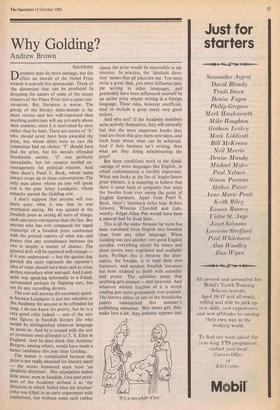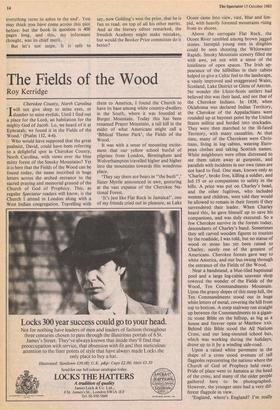Why Golding?
Andrew Brown
Stockholm
Dynamite may do more damage, but the .1.-leffect on morals of the Nobel Prize awards is scarcely less spectacular. Think of the dissension that can be produced by. dropping the names of some of the recent winners of the Peace Prize into a quiet con- versation. But literature is worse. The gossip of the literary demi-monde is far more vicious and less well-expressed than anything politicians will say privately about their enemies, since it is motivated by envy rather than by hate. There are stories of 'X' who should never have been awarded the prize, but whose debts were so vast the committee had no choice. 'Y' should have had the prize, but his morals offended Stockholm society. 'Z' was perfectly unreadable, but his country needed en- couragement for political reasons. And then there's Pearl S. Buck, whose name always crops up in these conversations The only man about whom no one will speak evil is the poet Artu,r Lundquist, whose remarks started the Golding row.
I don't suppose that anyone will ever learn quite what it was that he was ,overheard saying. He was quoted in the Swedish press as saying all sorts of things, each one more outrageous than the last. But anyone who has ever compared the taped transcript of a Swedish press conference with the printed reports of what was said knows that any resemblance between the two is largely a matter of chance. The general drift will be reported well enough — if it was understood — but the quotes that garnish the story represent the reporter's idea of' what should have been said as often as they reproduce what was said. And Lund- quist was speaking informally to a friend, surrounded perhaps by flapping ears, but not by any recording devices.
The row will anyway die extremely quick- ly because Lundquist is just too valuable to the Academy for anyone to be offended for long. I do not know his poetry, but he is a very good critic indeed — one of the very rare figures in Swedish literary life who would be distinguished whatever language he wrote in. And he is treated with the sort of reverence once afforded to T. S. Eliot in England. And he does think that Anthony Burgess, among others, would have made a better candidate this year than Golding.
The matter is complicated because the prize is not really awarded for literary merit 7 the works honoured must have 'an idealistic direction'. This stipulation makes little sense, even in Swedish. One past presi- dent of the Academy defined it as 'the direction in which Nobel blew his brother' (who was killed in an early experiment with explosives), but without some such rubber clause the prize would be impossible to ad- minister. In practice, the 'idealistic direc- tion' means that all jokes are out. You must write a great deal, you must influence peo- ple writing in other languages, and preferably have been influenced yourself by an earlier prize winner writing in a foreign language. These rules, however unofficial, tend to exclude a great many very good writers.
And why not? If the Academy members write actively themselves, they will naturally feel that the most important books they read are those that give them new ideas, and fresh hope about what can be achieved. And if th& business isn't writing, then what are they doing administering the prize?
But these conditions work to the disad- vantage of worn languages like English, in which craftsmanship is terribly important. When one looks at the list of Anglo-Saxon prize winners, it is tempting to believe that there is some fault of sympathy that stops the Swedes from ever seeing the point of English literature. Apart from Pearl S. Buck, there's Steinbeck (who beat Robert Graves), Winston Churchill and Gals- worthy. Edgar Allen Poe would have been a natural had he lived later.
This is all the odder because far more has been translated from English into Swedish than from any other language. When Golding was just another very good English novelist, everything except his essays and short stories were translated and available here. Perhaps this is because the alter- native, for Swedes, is to read their own literature, and modern Swedish literature has been steamed to death with subsidies and praise. The subsidies mean that anything gets printed — and reviewed. And whatever minute fraction of it is worth reading gets quite grotesquely over-praised. The literary editor of one of the Stockholm papers summarised this summer's publishing sensation: 'Boy meets girl, they make love a lot, then jealousy appears and 'It's a sex-objet d'art.' everything turns to ashes in the end'. You may think you have come across this plot before: but the book in question is 400 pages long, and this, my informant thought, was its chief merit.
But let's not snipe. It is safe to say, now Golding's won the prize, that he is fun to read, on top of all his other merits. And as the literary editor remarked, the Swedish Academy might make mistakes, but would the Booker Prize committee do it better?











































 Previous page
Previous page